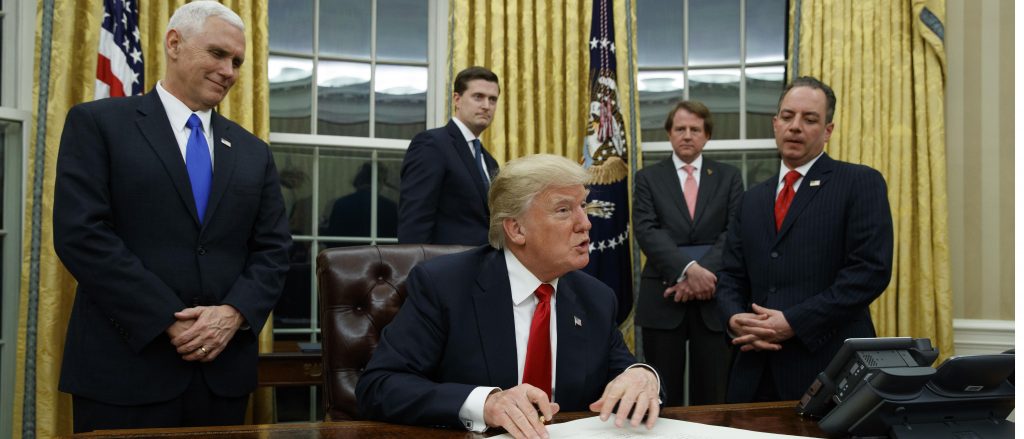National security was the cornerstone of President Trump’s election campaign. Trump even made the promise of a “total and complete” ban on all Muslims coming to the U.S. On Jan. 27, President Trump lived up to his ideals by signing an executive order that was a part of a vetting plan to keep out “radical Islamic terrorists” by blocking immigrants from a list of seven countries and also refugees from war-torn nations. Based on reports by the New York Times, a religious test was also incorporated. This test prioritized Christians and other minorities born in said seven countries – Syria, Iraq, Iran, Yemen, Somalia, Sudan and Yemen – be prioritized over the Muslims.
Based on reports by USA Today, Trump has signed six executive orders in his first ten days, the most by any president in their first ten days since the end of World War II. Trump criticized President Obama’s “illegal and overreaching executive orders” not very long ago as a Presidential candidate. Far from curbing down the policies of Reagan, as promised in the campaign, Trump has reinstated them with added vigor. Specific private companies – Keystone XL and Dakota Access pipelines – have been approved for several permits. Global health groups that promote abortion have been nearly cut off from federal funding. Regulatory processes were held in a tighter White House grip when President Trump insisted that agencies strictly follow the regulations approved by the President that are a part of the annual budgeting process. More extensive reports by USA Today informed that a new executive order – The National Security Presidential Memorandum – has been created to categorically give orders to the Pentagon and thereby secure his political strategist a spot at all National Security Council meetings.
On Jan. 28, Trump shook the world when he banned more than 218 million people from the United States and denied entry to all refugees. The repercussions of this particular executive order were felt the world over, especially as U.S. airports tried to grapple with the instant onslaught of functional disorder. Law agencies, American and foreign, were trying to grab a foothold and make sense of the aftermath of Washington’s new policy which states that citizens of seven Muslim-majority countries will be barred from entering the United States for the next 90 days and that Washington will also suspend the admission of all refugees for 120 days.
Based on reports by The Atlantic, anyone with U.S. citizenship will not be affected. However, the White House Chief of Staff, Reince Preibus, made it clear that the order is more restrictive than what was earlier assumed. Preibus went on to announce on NBC’s Meet the Press that Customs and Border Patrol agents would have the unquestionable authority to question U.S. citizens travelling from any of the aforementioned seven countries. The Atlantic quoted him as saying that “I would suspect that if you’re an American citizen traveling back and forth to Libya, you’re likely to be subjected to further questioning when you come into an airport.” In essence, all greencard and visa holders from those countries who hold dual citizenship with another country that does not include the U.S. are under constant suspicion and can be potentially barred from entering the U.S. Refugees and immigrants from the seven Muslim countries are strictly banned from entering the U.S. for the foreseeable future, with no exceptions whatsoever.
Continuing and increasing the action against the order, judges in four cities – Alexandria, Boston, New York and Seattle – ruled against the detention of individuals at airports. The Atlantic further mentioned that the Department of Homeland Security said that it would comply with the orders, meaning some of the people being detained at airports were allowed to leave.
The ACLU showed clear resistance to the order as it filed a motion for class certification, which is something that would legally permit it to represent those who say they were detained at airports and other ports of entry to the U.S.
Closer to home at Michigan Tech, an international student who wishes to remain anonymous is of the opinion that if this issue is not resolved soon enough, she and her husband will leave the U.S. for another country. The husband had offers to pursue his PhD from other countries but the two of them made a decision to choose the U.S. because it was safe at that time and expected to stay safe and open to all. She further added that regardless of whether the issue is solved soon or not, these stressful times have started to negatively affect her work.
International Programs and Services has communicated precisely what the immigration ban entails and what its possible implications would be. IPS and other members of the Michigan Tech community have offered their wholehearted support and assistance to all one and alike.
Michigan Tech President Glenn D. Mroz sent out an email to students, faculty and staff colleagues reassuring everyone that “we can and we will defend the Constitutional Rights of all in the Michigan Tech Community.”





